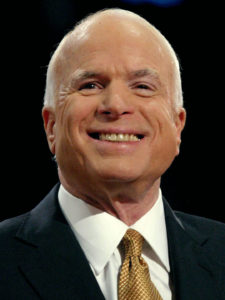By Congressman Chris Smith
 Senator John McCain was an extraordinarily brave and noble man—a hero—a dedicated husband, father, fighter pilot, and an amazing lawmaker. He endured and overcame unspeakable horrors as a POW, and as a lawmaker never ceased working for members of our armed forces and veterans. And on matters of principle and conviction, Senator McCain was fiercely independent, always willing—even eager—to bend into the wind and not with it.
Senator John McCain was an extraordinarily brave and noble man—a hero—a dedicated husband, father, fighter pilot, and an amazing lawmaker. He endured and overcame unspeakable horrors as a POW, and as a lawmaker never ceased working for members of our armed forces and veterans. And on matters of principle and conviction, Senator McCain was fiercely independent, always willing—even eager—to bend into the wind and not with it.
My wife Marie and I will always cherish and deeply respect the incomparable Senator John McCain. Our prayers go out to his Cindy and his entire family.
Posted: August 26th, 2018 | Author: admin | Filed under: Chris Smith | Tags: Chris Smith, John McCain | 1 Comment »
 TRENTON — Donald Trump, the outspoken billionaire who caused many critics to scoff when he announced last month he was running for president, has quickly become a focal point in the crowded race for the 2016 Republican nomination. His controversial comments have flooded media coverage. His fellow candidates constantly field questions about him. And this week,… Read the rest of this entry »
TRENTON — Donald Trump, the outspoken billionaire who caused many critics to scoff when he announced last month he was running for president, has quickly become a focal point in the crowded race for the 2016 Republican nomination. His controversial comments have flooded media coverage. His fellow candidates constantly field questions about him. And this week,… Read the rest of this entry »
Posted: July 19th, 2015 | Author: admin | Filed under: 2016 Presidential Politics, Donald Trump | Tags: 2016 Presidential politics, Donald Trump, Immigration, John McCain, Mexico, Sen John McCain | 1 Comment »
“I voted for Obama in 2008, but I’m not going to vote for him this time.”
By Adam Geller
We’ve all heard someone utter this phrase, or something close to it by now. Whether we are in the business of politics, analyzing polls and focus groups, or having a more casual conversation about the political scene, this is a statement that seems to come up more often as we draw closer to Election Day 2012.
Now, to be fair, there are plenty of folks who are saying, “I voted for Obama in ’08, and I will vote for him again in ’12.” As long as we are being fair, let us also acknowledge the fact that we have yet to hear anyone state that they voted for McCain last time, but this time they will vote for Obama.
So, the pressing question is the extent to which previous Obama voters will, in fact change their mind. How many mind-changers are needed to make a difference, and swing the election away from Obama?
The answer is: not that many.
Rather than add to the body of analysis that already exists on a state-by-state basis, I want to simply concentrate on the popular vote. In sticking with an analysis of the popular vote, I make every assumption that much of the movement that I describe herein would take place in the battleground states with which we are all familiar.
Let’s start with a reasonable, conservative (small c) theory: let’s assume that no more than one-out-of-ten 2008 Obama voters actually do, in fact, change their minds and this time vote for the Republican. Now, some may say that the actual number may be higher than that, but for now, let’s stick with a smaller safer assumption. Let’s also assume, for now, that turnout matches 2008 turnout.
First, let’s go back and look at the actual popular vote results. Recall that in 2008, the vote tally was:
Read the rest of this entry »
Posted: May 2nd, 2012 | Author: admin | Filed under: 2012 Presidential Politics | Tags: "Ronald Reagan", Adam Geller, Barack Obama, Bill Clinton, Buyers Remorse, George H.W. Bush, Gerald Ford, Jimmy Carter, John McCain, National Research Inc., Polls, Ross Perot | 18 Comments »
By Bob English
With the Presidential primary season well under way, we are now being treated to candidates going from state to state almost every week in an effort or convince voters that they are the right person to lead the country. If you are wondering when the candidate train stops in New Jersey, well I have some bad news. Last September, the Lieutenant Governor signed a bill approved by the Legislature, which moved the New Jersey 2012 Presidential Primary from February (when it had been held in 2008 on the 5th of February aka “Super Tuesday” ) to June 5, 2012. In 2005, the Legislature had voted to move the 2008 primary which had normally been held in June, to February in an effort to try to give New Jersey voters more influence in picking their party’s Presidential candidates. In 2008, despite the fact that New Jersey’s primary was held on the same day as those in over 20 other states, several candidates did campaign in New Jersey despite it not getting as much of a national focus as had been hoped for. Over 1.1 million residents voted in the 2008 New Jersey Democratic Primary which was won by Hilary Clinton over Barack Obama. In the Republican contest, over 500,000 people went to the polls in an election that saw the party’s eventual nominee John McCain almost doubling the amount of votes received by the 2nd place finisher Mitt Romney. It was estimated that the cost of moving the primary from June to February was $12 million.
What makes the participation numbers interesting is when you weigh them against the number of voters taking part in the first two caucuses or primaries this year. Roughly 122,000 people voted in the Iowa Republican caucuses with approximately 250,000 people voting in the New Hampshire GOP Primary. Although there was a Democratic caucus in Iowa and a primary in New Hampshire, they were not competitive races with President Obama virtually unopposed for his party’s nomination. With several Republicans dropping out of their party’s contest just before, during or right after these races, the amount of influence these states have in choosing a party’s nominee is hugely out of proportion to the numbers of voters who take part. Contrast these participation numbers with those of the 2008 general election where close to 130 million voters went to the polls.
So the questions that beg for answers are 1) How can New Jersey residents become more influential in the process of picking their party’s candidate (besides moving to Iowa or New Hampshire for a few months every four years)? 2) What can be done to make the choice of each party’s nominee less dependent on voters in one or two states where they clearly have to much power and contain voters whose views are not always representative of the majority of voters in other states. Note that major issues in Iowa where farm subsidies, ethanol, religion/faith and social issues. One thing is for sure, none of those three would be the top issues for the majority of New Jersey voters. There are no easy answers to question #1. The major party’s threatened loss of convention delegates to States which were going to hold their primaries too early in the 2012 process. One idea for 2016 would be for the state to revert to the 2008 model and possibly schedule its primary in mid/late February or early March of 2016 (This also depends on party scheduling rules that can change.) As mentioned above, this change does come with additional cost ($12 million) and there is no guarantee that the nomination for one or both parties would not have been secured by that date.
The other idea which has been debated for several years, is holding a series (4-6) of regional primaries in the early March to early June time-frame. The order of these would rotate every four years. This would give more states greater influence in picking the eventual nominees. Even if Iowa and New Hampshire kept their traditional places at the starting gate, they would not have the same importance or as great a focus on by candidates.
Since 1976, only 3 of the 18 nominating contests were so close that almost every delegate mattered to the eventual nominee. A couple of interesting historical facts about New Jersey Presidential Primaries are:
In 1972, Congresswoman Shirley Chisholm won the states Democratic Primary. Rep. Chisholm was the first woman to run for the Democratic Presidential nomination and the first major party African American Presidential candidate.
In 1976, in an unsuccessful effort to stop Jimmy Carter from obtaining the Democratic nomination, a slate of uncommitted delegates backing Senator Hubert Humphrey and then (and current) California Governor Jerry Brown, defeated Carter by a wide margin. Carter’s primary win in Ohio the same day however, cinched the nomination for him. I attended a campaign rally for Governor Brown the day before the election at Airport Plaza in Hazlet on June 7, 1976. The story was the lead in the next days Red Bank Register and can be viewed here:
http://209.212.22.88/DATA/RBR/1970-1979/1976/1976.06.08.pdf
Posted: January 30th, 2012 | Author: admin | Filed under: 2012 Presidential Politics, New Jersey | Tags: Bob English, Hubert Humphrey, Iowa, Jerry Brown, Jimmy Carter, John McCain, Kim Guadagno, Mitt Romney, New Hampshire, New Jersey, New Jersey Presidential Primary, Presidential primary, primaries, Shirley Chisholm | 8 Comments »

Not Rush Holt. Photo by Mike Halfacre
By Art Gallagher
Congressman Rush Holt has failed to get the Sgt. Coleman S. Bean Individual Ready Reserve Suicide Prevention Act of 2010 passed into law. Had the bill become law, it would have earmarked $20 million for the Defense Department to prevent suicide by combat veterens through advertsisng, social media and phone calls.
Holt tauted the bill, as if it was already law, as one of his major accomplishments and a reason to reelect him during the 2010 12th district congressional campaign.
On October 22, 2010 during the heat of the campaign, MMM reported that the bill was not law. We asserted that it would never become law and that Holt was cynically and shamelessly using his sponsorship of the law, and exploiting Sgt Bean’s family for his own political advantage.
Now Holt says he’s furious that the the provisions of the bill have been dropped from the final version of the Defense Appropriations Act presented to both houses of Congress. He blames Senator John McCain for having the language of the bill removed from the Appropriations Act during the reconciliation process between the House and Senate versions of the bill.
Holt told mycentraljersey that McCain told him he blocked the Bean bill language and would continue to do so. “Maybe you need this in New Jersey, but we don’t need it in Arizona,” Holt says McCain said.
Posted: December 18th, 2010 | Author: Art Gallagher | Filed under: Rush Holt | Tags: John McCain, Rush Holt, Sgt. Coleman S. Bean | Comments Off on Holt Fails To Get Bean Bill Passed
 Senator John McCain was an extraordinarily brave and noble man—a hero—a dedicated husband, father, fighter pilot, and an amazing lawmaker. He endured and overcame unspeakable horrors as a POW, and as a lawmaker never ceased working for members of our armed forces and veterans. And on matters of principle and conviction, Senator McCain was fiercely independent, always willing—even eager—to bend into the wind and not with it.
Senator John McCain was an extraordinarily brave and noble man—a hero—a dedicated husband, father, fighter pilot, and an amazing lawmaker. He endured and overcame unspeakable horrors as a POW, and as a lawmaker never ceased working for members of our armed forces and veterans. And on matters of principle and conviction, Senator McCain was fiercely independent, always willing—even eager—to bend into the wind and not with it.

